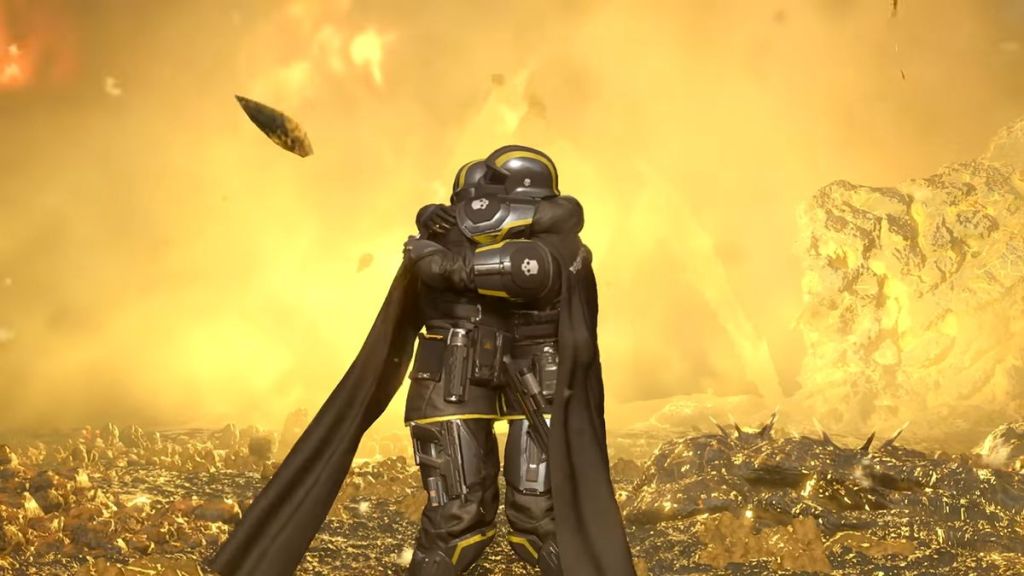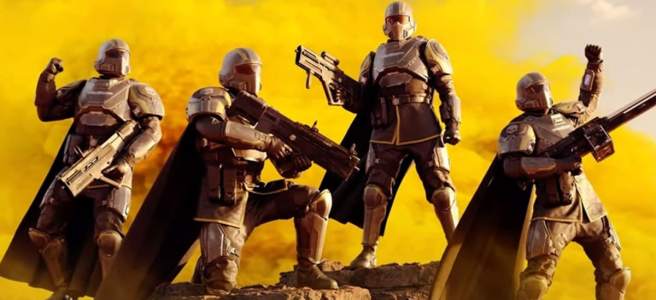Not just an amazingly fun game which reinvents a lot of how we play online experiences in the modern PvP obsessed world which sucks much of the fun out of gaming for me, Helldivers 2 delivers a fascinating look at how the future of war might unfold. Too much? Hear me out!
In Helldivers 2, you’re one of the titular Helldivers, spat out in orbit to take the fight to the enemies of humanity and freedom! Whether its going down with your buddies against alien bugs, communist robots, or alien scum, you’re the bloody tip of the spear spitting righteousness from the barrel of a gun. Or perhaps more accurately, calling down death from above with the super destroyers in orbit raining hate on whatever unfortunate enemies happen to be in range of your targeting laser. That is, among other things, just the beauty of Helldivers. You can spit out bullets all you want, but there’s a wave of death waiting in orbit to smite your enemies like the vengeful hand of God!
What got me thinking, was Brett Devereaux tweet regarding how, even as parody, the game sets up a believable combat model for future infantry tactics. This is, to my science fiction and military obsessed brain, an intriguing idea that I had to ponder on.
While you and your mates are technically the tip of the spear from a tactical perspective, strategically you are nothing but a glorified artillery spotter. Yes you engage in heavy fighting with a wide variety of weapons, but you’re doing it to get strategems, those sweet death dealing airstrikes. Whether it is an airstrike or an orbital bombardment, those are what destroys enemies by the dozens. You my gun toting friend are just along for the ride! Not that it isn’t fun to be doing it!
Thinking about this in the most abstract of science fiction terms, you are a soldier who goes to the front lines, but largely are doing activities that will help you call in airstrikes in game. If I were a Helldiver in real life, I’d be raining death down my opponents from orbit at every chance I got! Big cluster of bugs? Zap ’em from orbit! Automated factory sending waves of homicidal robots my way? Rods from God as the ultimate dissembler. Unexpected aliens? Nuke the site from orbit, it’s the only way to be sure! I think we can all see the appeal of not having to get up close and personal with particularly nasty specimens of interstellar murder! Only getting close enough for the ships in orbit to flatten them

It is something like having the Hammer of Dawn lasers in Gears of War where you can rain death from above with impunity. Or in the amazing Frontlines series where the protagonist is a combat controller on alien worlds and one of their main jobs is to guide the fleet’s heavy ordinance against the alien threat! When you think about it, that might be all you need as an invading force, just enough boots on the ground to target the enemy’s hardened installations and blast them until he cries uncle. There’s certainly an advantage to this for the attacker. No legions of soldiers having to be dropped like an interstellar Operation Barbarossa, just enough to establish a beachhead at important points and then make your presence overwhelmingly powerful.
For the defender, if you’re shorne of fleet protection (or fighting in orbit) you just need to kill these interlopers so the fleet can’t get a good read on the fluid tactical situation or send the accurate coordinates of bases. There’s some bare bones thinking here, but it just needs to be emphasized that the power of orbital bombardment is immense. You control the ultimate high ground, and while that doesn’t make you invulnerable, it does give you a huge advantage when fighting to control a planet (or any other ground really). It’s something I like seeing done well in science fiction. It plays a part in my own upcoming novel The Virtue of Battle as well.
Returning to Helldivers comparisons though. For gameplay reasons there’s little impact on your fighting on the ground from any fighting in orbit, an contested battlespace like this would be one where you the poor infantry on the ground, would be desperate for that air support. That way you are always rooting for your fleet and doing whatever it takes to support them. Perhaps that is taking out planetary based anti-space weapons, or even messing with the enemies command and control abilities. There’s a lot of room to imagine these tactics and strategies, especially in fiction. Getting the blend of ground and space combat can be oh so satisfying in good fiction!
Personally, from both a story and a military perspective, it does seem like an idea with merit. This is even in the near future. An elite team of soldiers inserted into, say, Martian separatist positions to call down a strike on a strong point, makes for a compelling case against too many boots on the ground. Obviously you need some, but not necessarily an entire army. Warfare in the future could be the equivalent of sending in a platoon of Navy Seals or SAS and having them target enemy concentrations and then blow them to kingdom come to induce them to surrender.
Would that necessarily work? Who knows! But it is fun from a gameplay and a store perspective!


Great post. Want to say that this isn’t new. To quote general William DePuy (pgs 86-87):
“
One of the comments that I’ve made has infuriated the Infantry School. Now, I
don’t blame them for being infuriated, but I honestly concluded at the end of World War II, when I soberly considered what I had accomplished, that I had moved the forward observers of the artillery across France and Germany. In other words, my battalion was the means by which Field Artillery forward observers were moved to the next piece of high ground. Once you had a forward observer on a piece of ground, he could call up five to ten battalions of artillery and that meant you had moved combat power to the next observation point – more combat power than the light
infantry could dispose of. Now, you needed the infantry to do that. You needed the infantry to protect them, but the combat power came from this other source, and I think that trend has accelerated ever since. I think the infantry has the dirtiest job of them all. But, if you want to be rigorously analytical about what you’re really trying to do, it’s trying to move combat power forward to destroy the enemy, and the combat power that you are moving forward has been, in the past, mostly artillery, and that is even more true today.”
DePuy concludes that segment with:
“The infantry is a sensor. It’s a sensory organization that works into the fabric of the terrain and the enemy, and can call in all of this firepower – including artillery and TAC air that can really do the killing .”
LikeLiked by 1 person
A very prescient quote, I do believe. Infantry has the important role of “boots on the ground” still, as it is the only force which can hold ground. But on the whole, in terms of actual combat and killing power, it is the artillery, missiles, and air power that inflicts the damage. In the future we might reasonably assume it is the space power that does it. Infantry then is, as DePuy puts it ‘the sensory organ’ that guides that awesome power to its intended target in the most efficient way possible.
LikeLiked by 1 person